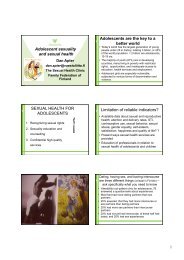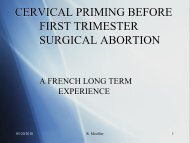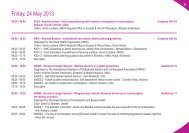Journal of Contraception Reproductive Health Care - The European ...
Journal of Contraception Reproductive Health Care - The European ...
Journal of Contraception Reproductive Health Care - The European ...
Create successful ePaper yourself
Turn your PDF publications into a flip-book with our unique Google optimized e-Paper software.
<strong>The</strong> 8th Congress <strong>of</strong> <strong>The</strong> <strong>European</strong> Society <strong>of</strong> <strong>Contraception</strong> Abstracts <strong>of</strong> Free Communications<br />
FC2-06<br />
Teen4.info: a qualitative study to develop and evaluate <strong>of</strong> a reproductive health website developed in<br />
partnership with teenagers and young parents from Oxford and Great Yarmouth<br />
C. Pyper (1), P. Johnson (2), J. Knight (1), C. Crook (3), S. Kaduskar (4), A. Boutyeb (5)<br />
Department <strong>of</strong> Public <strong>Health</strong>, University <strong>of</strong> Oxford, Old Road Campus, Oxford, OX3 7LF, UK (1); Department <strong>of</strong> Obstetrics &<br />
Gynaecology, University <strong>of</strong> Oxford, Oxford Radcliffe Hospital, Oxford, UK (2); Bury Knowle <strong>Health</strong> Centre, Oxford, UK (3); Consultant<br />
to Bury Knowle <strong>Health</strong> Centre, Oxford, UK (4); Young parent support worker, Bury Knowle <strong>Health</strong> Centre, Oxford, UK (5); Funding:<br />
British Telecom Higher Education Award & DoH Teenage Pregnancy Unit, DLM Trust<br />
Introduction: <strong>The</strong> UK has the highest incidence <strong>of</strong> teenage pregnancy in Europe, which contributes to a high proportion <strong>of</strong><br />
socially disadvantaged single parents. In addition to unhealthy lifestyles many are also infrequent attendees <strong>of</strong> antenatal health care<br />
systems and have poor pregnancy and perinatal outcomes, which may have long-term health, social and economic consequences.<br />
Aim: To use website technology and a participatory approach to improve health promotion about <strong>Reproductive</strong> <strong>Health</strong> including:<br />
reproductive & sexual health; access to local groups and services and accesses to educational and vocational training opportunities.<br />
Design and setting: A qualitative study in primary health care centres.<br />
Subjects: Teenagers and young parents living in Oxford and Great Yarmouth.<br />
Methods: <strong>The</strong> research involves the development and evaluation <strong>of</strong> information about reproductive health relevant to the target<br />
groups. <strong>The</strong> facilitators and support workers from the project team and young parents from each <strong>of</strong> the communities involved<br />
are working together to develop the pilot website A variety <strong>of</strong> methods is being used to support the participants in the development<br />
and co-ordination <strong>of</strong> the website, including facilitated group discussion, personal stories (narratives) and frequently asked<br />
questions. <strong>The</strong> information is frequently displayed as a series <strong>of</strong> images to assist those with low literacy skills. <strong>The</strong> participatory<br />
techniques used ensure that the content and design <strong>of</strong> the information is locally relevant and easily understood by the target<br />
group. An example <strong>of</strong> the information currently under development can be viewed at the website: www.Teen4.info. <strong>The</strong><br />
website includes a locally relevant section for each community and a ‘core’ section (or hub) which is focussing on general issues<br />
developed in collaboration between the communities.<br />
Evaluation: An initial evaluation <strong>of</strong> the teenage website project has been completed. A questionnaire survey and focus groups<br />
with teenagers and young parents who to date have not been involved in the development <strong>of</strong> the content <strong>of</strong> the web-site is<br />
being conducted in order to gain further understanding about the social, health and educational needs <strong>of</strong> teenagers who are<br />
vulnerable to becoming parents.<br />
Results: <strong>The</strong> evaluation will describe the key lessons learnt under five headings: historical development <strong>of</strong> the website; the facilitators’<br />
experience <strong>of</strong> involvement; the participants’ experience <strong>of</strong> involvement; the participatory methodology <strong>of</strong> the facilitation process; the<br />
development <strong>of</strong> ideas and concepts tried and revised. We will also present preliminary findings from the questionnaire survey<br />
Conclusion: A reproductive health website needs to be dynamic and responsive to the needs <strong>of</strong> local groups. Many young<br />
people prefer images and photos to large amounts <strong>of</strong> written text. <strong>The</strong>re is a need for peer group support workers to facilitate<br />
young parenting groups. <strong>The</strong>re is a need for designers involved with the website development to become IT support workers<br />
and work directly with the groups. <strong>The</strong> process <strong>of</strong> developing the website in a participatory way is method for delivering a<br />
health promotion to disadvantaged young parents.<br />
FC2-07<br />
Effects <strong>of</strong> a gender-specific sexual health promotion program (‘female doctor’s lesson’) in schools<br />
C. Klapp (1,2), G. Gille (2), C. Thomas (3), I. Schönborn (1)<br />
Department <strong>of</strong> Obstetrics, Charité Virchow Hospital, Humboldt University <strong>of</strong> Berlin, Germany (1); Medical Association <strong>of</strong> Women’s <strong>Health</strong><br />
Promotion, GGF e.V. Düsseldorf, Germany (2); Research Unit Child and Adolescent <strong>Health</strong>, Robert Koch Institute Berlin, Germany (3)<br />
Introduction: Numbers <strong>of</strong> pregnancies and abortions in young girls - particularly in very young girls from 10 to 14 years <strong>of</strong> age<br />
- have increased rapidly since 1996.<br />
Girls in that age group seem to overestimate their knowledge concerning sexuality, pregnancy and contraception as well as<br />
STDs. We deal with a media-experienced generation, who has heard a lot but understood very few and feel highly under pressure<br />
to have their own sexual experiences very early.<br />
Aims and methods: 1.911 students grade 6 and grade 9/10 (aged 10 to 18) were randomized into intervention and control<br />
groups. <strong>The</strong> intervention group attended a special ‘doctor’s lesson’ Pre (T1) and post (T3) intervention questionnaires (T1-T3=2<br />
weeks) combined 57 items covering actual knowledge, 62 items for actual feelings and attitudes and 14 epidemiologic items.<br />
After the interventional lesson (T2) the students had to rate the comprehensibility and usefulness <strong>of</strong> this lesson.<br />
Results: At T 1, before intervention, we found large knowledge deficiencies in both groups. Only 39% <strong>of</strong> the answers were<br />
correct. In 90% comprehensibility and usefulness <strong>of</strong> the intervention was estimated as good and very good.<br />
In grade 6 more than 50% <strong>of</strong> the girls didn’t know about the first menstruation being connected to the possibility <strong>of</strong> getting<br />
pregnant. So did 25% <strong>of</strong> the girls in grade 9/ 10. Two weeks after our interventional lesson 88% <strong>of</strong> the younger and 91% <strong>of</strong> the<br />
older girls were able to answer the questions properly. <strong>The</strong> same lack in general knowledge could be observed with respect to<br />
topics like ‘morning after pill’s, ’menstruation’ and ‘sexually transmitted diseases’.<br />
After a 90 minutes intervention, the overall increase <strong>of</strong> knowledge was extremely high with 32% in grade 9/ 10 and 84% in grade 6.<br />
Discussion: Age related medical information by female doctors for female students - empathic, but competent – could improve<br />
the knowledge <strong>of</strong> students effectively and could therefore play an important role in the promotion <strong>of</strong> sexual health and primary<br />
prevention <strong>of</strong> pregnancy in young girls.<br />
36 <strong>The</strong> <strong>European</strong> <strong>Journal</strong> <strong>of</strong> <strong>Contraception</strong> and <strong>Reproductive</strong> <strong>Health</strong> <strong>Care</strong>








